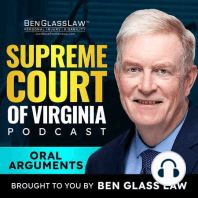36 min listen

November 2019 - Flint Hill School v McIntosh
November 2019 - Flint Hill School v McIntosh
ratings:
Length:
34 minutes
Released:
Nov 30, 2019
Format:
Podcast episode
Description
This podcast is provided by Ben Glass and Steve Emmert www.BenGlassReferrals.com - www.Virginia-Appeals.com Granted Appeal Summary Case FLINT HILL SCHOOL v. ALESSIA MCINTOSH (Record Number 181678) From The Circuit Court of Fairfax County; D. Bernhard, Judge. Counsel Timothy B. Hyland, Elizabeth A. Dwyer, Tyler Southwick (HYLAND LAW PLLC) for appellant. Harris D. Butler, III (BUTLER ROYALS, PLC), Cyrus Mehri (MEHRI & SKALET, PLLC) for appellee. Assignments of Error The trial court erred in holding that Roger McIntosh, a co-obligee under the parties’ contract, was not a necessary party to Alessia McIntosh’s declaratory judgment action against Flint Hill School. The trial court erred in holding that the filing of a declaratory judgment action “trigger[s] the applicability of a contract clause sought to be declared unlawful,” as such holding is contrary to law as set forth, inter alia, in Martin v. Garner, 286 Va. 76, 84, 745 S.E.2d 419, 423 (2013) (holding that the fact that the relevant parties “were before the court and the relevant deeds were in evidence,” is insufficient to establish a justiciable controversy between the parties.). The trial court erred in overruling Flint Hill School’s demurrer to Alessia McIntosh’s declaratory judgment claim, because the complaint did not contain an allegation that there existed an actual or justiciable controversy, nor an actual antagonistic assertion and denial of right, and because the complaint sought relief as to a hypothetical and speculative claim. The trial court erred in overruling Flint Hill School’s plea in bar to Alessia McIntosh’s declaratory judgment claim, because the uncontroverted evidence presented to the trial court established that there was no actual or justiciable controversy, nor an actual 2 antagonistic assertion and denial of right, and because Alessia McIntosh sought relief as to a hypothetical and speculative claim. The trial court erred in granting Alessia McIntosh’s motion for summary judgment, because material facts were genuinely in dispute as to whether there existed an actual or justiciable controversy, and an actual antagonistic assertion and denial of right, and because Alessia McIntosh sought relief as to a hypothetical and speculative claim. The trial court erred in granting Alessia McIntosh’s motion for summary judgment as to the unenforceability of the attorneys’ fees clause in the parties’ contract, because material facts were genuinely in dispute, and the trial court was presented with no facts, as to whether the challenged contractual clause was procedurally unconscionable. The trial court erred in granting Alessia McIntosh’s motion for summary judgment as to the unenforceability of the attorneys’ fees clause in the parties’ contract, because material facts were genuinely in dispute, and the trial court was presented with no facts, as to whether the challenged contractual clause was substantively unconscionable. The trial court erred in granting Alessia McIntosh’s motion for summary judgment as to the unenforceability of the attorneys’ fees clause in the parties’ contract, because material facts were genuinely in dispute, and the trial court was presented with no facts permitted to be considered under Rule 3:20, as to whether the challenged contractual clause significantly bars potentially meritorious resort to the courts by Alessia McIntosh. The trial court erred in granting Alessia McIntosh’s motion for summary judgment as to the unenforceability of the attorneys’ fees clause in the parties’ contract, because there is no “corollary principle discerned from the Rules of Professional Conduct not to punish the prevailing party in litigation with payment of the loser’s expenses,” as (a) no such principle exists; and (b) even if such principle existed, it does not mandate invalidation of the challenged contractual clause; and (c) material facts were genuinely in dispute, and the trial court was presented with
Released:
Nov 30, 2019
Format:
Podcast episode
Titles in the series (100)
January 2020 Davis Construction v. FTJ, INC: This podcast is provided by Ben Glass and Steve Emmert - Granted Appeal Summary Case JAMES G. DAVIS CONSTRUCTION CORPORATION v. FTJ, INC., F/K/A CIESCO, INC. (Record Number 190345) From Circuit Court of Arlington County; L. DiMatteo, Judge.... by Oral Arguments of the Supreme Court of Virginia